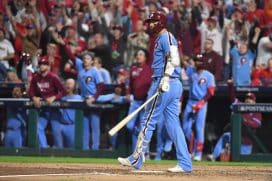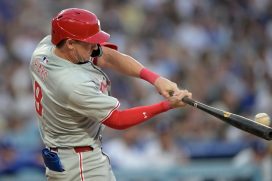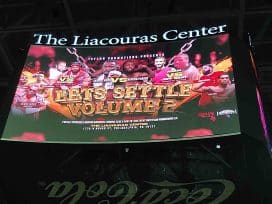Phillies
Top 25 Phillies of All-Time: No. 5, Robin Roberts
By Josh Liddick, Sports Talk Philly Staff
If there is a player in the history of the Philadelphia Phillies from the early years of the team that represents Philadelphia baseball better, it's Robin Roberts.
Roberts was born on September 30, 1926 in Springfield, Illinois. He attended Lanphier H.S. in Springfield, and then went on to college at Michigan State University.
From, there Roberts was signed by the Phillies as an amateur free agent in 1948. At the age of 21, Roberts made his major league debut with the team the same year he was signed.
Like most pitchers in major league baseball, Roberts started his big league journey by being utilized in the bullpen first, before being placed in the starting rotation.
In 1950, two years after entering the league, Roberts got to 20 wins for the first time, and led the league in shutouts with five. This was all enough to garner enough attention to select the right-hander as an All-Star that year.
Between the years of 1950 and 1956, Roberts could be considered one of the more dominant workhorse pitchers of that period of time. He played in more games than any other pitcher, and led the league in complete games for five straight seasons.
Between 1952-1956, Robin Roberts excelled, as he led baseball in wins in each of those five seasons.
Aside from pitching brilliantly throughout his storied career, Roberts had his way from the plate, establishing himself as a successful hitting pitcher. Roberts' best hitting season with the Phillies came in 1955, where he hit .252, had 27 hits, nine doubles, four triples, two home runs, and 13 RBIs in 107 at-bats.
By the end of his career, Roberts had pitched for 19 seasons, including a 14-year stint as a Phillie, and then five additional seasons as a member of the Baltimore Orioles, Houston Astros, and the Chicago Cubs.
Upon retirement in 1966 as the oldest player in Major League Baseball, after pitching in 676 career games, Roberts ended with a record of 286-245, 2,357 strikeouts, and a 3.41 ERA.
Career accomplishments
By the time his career was all said and done, Robin Roberts accomplished so much in Major League Baseball, so much of which has been etched in baseball history over the years.
In 1952, Roberts was the Major League Player of the Year award winner. In 1952 and 1955, Roberts was selected as the NL TSN Pitcher of the Year. Due to his pitching prominence during the years of 1950-1956, he was selected to the NL All Star Team seven times.
Roberts led the major leagues in Wins Above Replacement(WAR) for Pitchers for five straight years between 1950 and 1954, and also led all positions in WAR in 1952 and 1953.
Roberts never won an MVP with the Phillies, but he finished in the top ten in voting in five season, making the top five twice, and even finishing as runner-up in 1951.
After his first 20-win season in 1950, he racked up six straight 20+ win seasons.
Roberts was elected to the National Baseball Hall of Fame in 1976, getting 86.9% of the vote. Following that, his number '36' was retired by the Phillies, which now sits in it's rightful place in Ashburn Alley at Citizens Bank Park.
Top moment with team
Between August 1952 and June 1953, Roberts held a streak that may considered to be one of the greatest of all-time. Between that time period, Robin Roberts held a streak of 28 straight complete games.
For almost an entire year, the workhorse was never pulled early for the bullpen, and finished those games off strong. This was one of the many reasons why Roberts will be considered one of the most valuable and dominant pitchers of that era.
Besides the legendary complete game streak, Roberts will also be remembered for pitching to a 20-11 record in 1950, on the Phillies team dubbed the "Whiz Kids," and led the team to winning the National League Pennant.
Reason for ranking
According the countdown scientific formula, Roberts is ranked at fifth because of the WAR that he totaled as a member of the team. Throughout his career, Roberts compiled a 69.7 WAR, and averaged 4.97 WAR a season.
Since the WAR for being a starter is at least 2, for the amount of time Roberts pitched as a starter, he received a 13 for that category, 6 for the All-Star category, and a 4 for the MVP category.
He also played a significant amount of time as a Phillie, pitching for 14 seasons.
Roberts is second for Phillies pitchers all-time for wins (286) and is first in Phillies history for Win Probability Added (WPA).
The icing on the cake of Roberts' ranking on this list is his election to the Baseball Hall of Fame.
His total point accumulation was 66 on this scale, which is actually the fourth most of any Phillie. It will be explained in No. 4, why the decision was made to slot Roberts at No. 5.
Explanation of the scientific formula
The player rankings formula combines both traditional and advanced statistics/metrics and assigns a point total to each category. These statistics only reflect the player's Phillies career.
First, single season WAR is a primary factor in our rankings. According to WAR's calculations, 2+ WAR is considered a starter, 5+ WAR is All-Star caliber, and 8+ WAR is MVP level.
We totaled the number of seasons that a player performed at a 2+ WAR, 5+ WAR, and 8+ WAR level and assigned a set point value for each category, (+1), (+3), and (+5) respectively.
For example, in 1980, Mike Schmidt complied an 8.8 WAR. This was counted as a 2+ WAR season, a 5+ WAR season, and an 8+ WAR season. So, for 1980 alone, Mike Schmidt earned (9) points for WAR.
Second, we assigned a point value for amount of years spent with the Phillies. In order to be considered for this list, a player must have been with the organization for a minimum of (5) years.
Next, we assigned point values for being among the top 25 in particular statistical categories, such as batting average, hits, doubles, triples, RBI, home runs, and OPS for hitters, and ERA, Wins, and WPA (wins probability added) for pitchers.
Finally, all statistical categories were totaled up using our point based system and ranked accordingly, with historical columnist Matt Albertson and managing editor Tim Kelly of Sports Talk Philly reserving the right to move players up the list, within reason. An explanation of why a player is ranked in a certain spot will be provided, as will an overall score breakdown.
Previous entries to the countdown
- No. 25, Garry Maddox
- No. 24, Roy Thomas
- No. 23, Gavvy Cravath
- No. 22, Chris Short
- No. 21, Cy Williams
- No. 20, Curt Schilling
- N0. 19, Cole Hamels
- No. 18, Ryan Howard
- No. 17, Sam Thompson
- No. 16, Del Ennis
- No. 15, Johnny Callison
- No. 14, Jim Bunning
- No. 13, Dick Allen
- No. 12, Billy Hamilton
- No. 11, Sherry Magee
- No. 10, Bobby Abreu
- No. 9, Chuck Klein
- No. 8, Richie Ashburn
- No. 7, Jimmy Rollins
- No. 6, Chase Utley





